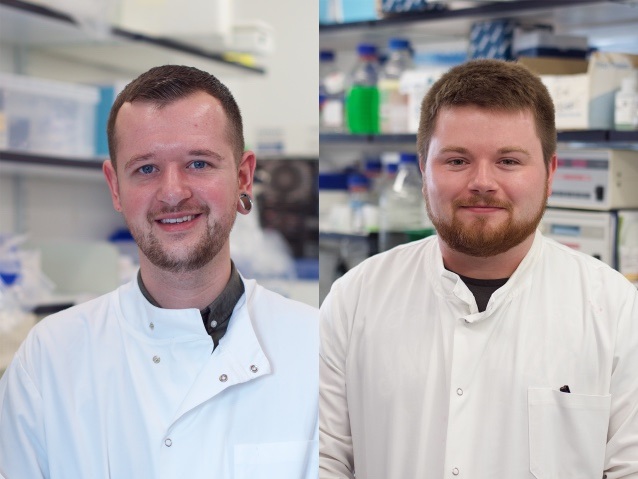The Sir James Black Award is an annual prize presented by the School of Life Sciences at the University of Dundee to the final year undergraduate student deemed to have made the most outstanding contribution to research during their final year project.
…moreNews
The Herne Katha team, who are renowned filmmakers from Nepal, visited Professor Gopal Sapkota’s laboratory at the MRC Protein Phosphorylation and Ubiquitylation Unit within the School of Life Sciences to document his journey and research.
…more
Abigail Brewer and Jin-Feng Zhao awarded the Howard Elder Prize 2024 for outstanding cancer research
Abigail Brewer, a recently graduated PhD student, and Jin-Feng Zhao, a postdoctoral researcher, from Prof. Gopal Sapkota’s lab at the MRC Protein Phosphorylation and Ubiquitylation Unit have been awarded the 2024 Howard Elder prize for their exceptional cancer discoveries on targeted dephosphorylation.
…moreIn a new discovery, scientists from the Sapkota lab, in collaboration with a team of clinicians led by Dr. Amaia Lasa-Aranzasti at Vall d'Hebron University Hospital in Barcelona, have uncovered how a novel a genetic mutation is responsible for causing a rare skin disorder known as palmoplantar keratoderma (PPK).
…moreIn a remarkable advancement for rewiring cellular signalling, researchers from the Sapkota Lab have developed a novel approach to precisely control the levels of protein phosphorylation.
…more
Gopal Sapkota awarded prestigious Biochemical Society 2025 Industry and Academic Collaboration Award
We are delighted to announce that Gopal Sapkota has received the prestigious Biochemical Society 2025 Industry and Academic Collaboration Award.
…moreProtein phosphatase 2A (PP2A) is a highly abundant and essential Ser/Thr phosphatase that regulates a plethora of cellular processes. PP2A primarily operates as a holoenzyme complex, comprising one each of the scaffolding (A), regulatory (B) and catalytic (C) subunits. PPP2CA is the principal catalytic subunit of the PP2A holoenzyme complex.
…moreTargeted protein degradation (TPD), induced by enforcing proximity in cells between a target protein and an enzyme called E3 ubiquitin ligase using small molecules has become an important drug discovery approach for targeting previously undruggable disease-causing proteins.
…more
Phosphorylation is a reversible post-translational modification bestowed on proteins, by which phosphate is added or removed from protein substrates. Reversible phosphorylation is capable of regulating proteins in virtually every conceivable way.
…moreTargeted protein degradation has become an exciting new drug modality. Tens of small molecule degraders, including proteolysis-targeting chimeras (PROTACs), have entered clinical trials to treat many different diseases.
…more










